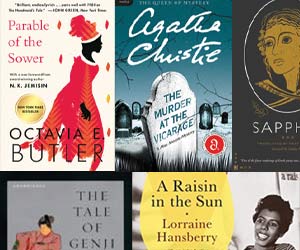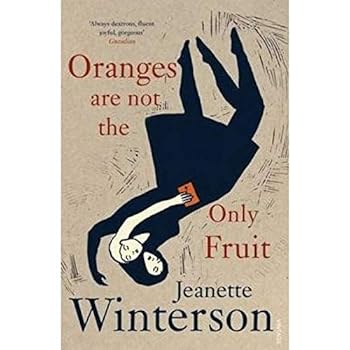Oranges Are Not the Only Fruit
Select Format
Select Condition 
Book Overview
Winner of the Whitbread Prize for best first fiction, Oranges Are Not the Only Fruit is a coming-out novel from Winterson, the acclaimed author of The Passion and Sexing the Cherry. The narrator,... This description may be from another edition of this product.
Format:Paperback
Language:English
ISBN:0099935708
Release Date:January 1992
Publisher:Vintage Books
Length:171 Pages
Weight:0.34 lbs.
Dimensions:7.8" x 0.6" x 5.1"
Related Subjects
Coming of Age Contemporary Fiction Genre Fiction Lesbian Literary Literature & FictionCustomer Reviews
7 ratings
Is this book religious?
Published by Ene , 1 year ago
I literally cannot tell.
Incorrect cover :( but it's a good read..
Published by Foxx , 2 years ago
So this book is really interesting. I like the way it's written and it's definitely worth a read no matter your walk of life. I'm happy I was able to get this book.
But I did pay about 5 dollars extra for a specific cover and I did not get the one I wanted. Which is disappointing because it's really the first time I've had this issue.
In her head she was still queen, but not my queen any more.
Published by Thriftbooks.com User , 19 years ago
"We stood on the hill and my mother said, `This world is full of sin.' We stood on the hill and my mother said, `You can change the world.'" Jeanette is an orphan child adopted my a fanatic Evangelical woman who believes that the child is sent to her by God. Jeanette's mother raises her with three strict ideas in mind for her- one, that she will be a missionary child... two, that she will be a servant of God... and three, that she will be a blessing. Her strict moral upbringing causes her severe grief when her mother has to enroll her into school at the age of seven. The children, the teachers, and even the administrators find her preaching attitude a bit unnerving. As a child her only friend is an older woman named Elsie Norris who is a bit of an eccentric, and her life is completely dominated by her mother's quest to convert all of the heathens in the world. But when she is 14 she meets a young woman from the fish market who will compromise everything that Jeanette knows about herself, but does not bring her to lose her faith in God. Rather the opposite, through a series of events during this friendship she finds herself being drawn closer into the fervor of her faith. It is not until the affair comes to a climax that Jeanette really begins to question the path her mother has set her on. "He turned to me. `I love her.' `Then you do not love God.' `Yes, I love both of them.' `You cannot.'" The book skillfully touches on the controversy of homosexuality in the Christian community, and deals with many of the biased points of views of that religion that still exists to this day. This is a tremendous book. The story has such depths of drama, pathos, and heartbreaking desire that it is impossible not to get swept up in the story. The clever use of narration that Winterson uses is periodically punctuated with fairy tales, Arthurian references, and Alice in Wonderland references as well- something that surely surprised and delighted me, a literary fan from way back. It's no surprise that this debut novel won the Whitbread Prize for first fiction when it was published in 1985. This book has definitely secured me as a Winterson fan for life.
Language as Art
Published by Thriftbooks.com User , 22 years ago
Winterson's first novel is a compelling story that presages her talent for finding themes that aren't last year's, or even today's, but cut the edge of tomorrow.No less importantly, it's the first look at a word smith of the finest calibre. Every word has import and can build, nuance by nuance, into breathtaking metaphors that only emerge after you've finished the book and find yourself thinking about it. I like to read Winterson out loud, because hearing words and reading them are two different experiences.This book is a must read because the true high art of lesbian-themed writing is found here.
The Creation of Reality
Published by Thriftbooks.com User , 23 years ago
This novel has often been criticised as Winterson's best now that she has gone on to write several powerfully experimental novels. This is implying that she should have remained in these more familiar regions of experience or stuck to a slightly more conventional mode of narrative. What's tremendous about this novel is the way it works as a perfect springboard for the kind of fiction that is being so negatively criticised for its inventiveness. This is a story about a girl who is struggling with the conventions of a restrictive Pentecostal community in a small spot of England, but it is also about the interplay between reality and fiction in people's lives. Jeanette's fables are established to be as valid as the complex religious practices of her family. The characters of the novel constantly differ to a fictional artifice to hold together the reality they cannot understand. Tension builds when the fictional worlds that people struggle to hold into place contradicts other people's realities. This novel is a tribute to the fight for independence and survival. She powerfully asserts that there is a necessary space for these fictional parts of people's realities despite the conflict it will inevitably create. She suggests that the reality built in fiction is also the truth of our own fictions accepted as reality. The interplay of these two creates a living reality.
Sinfully delightful marriage of tragedy and comedy
Published by Thriftbooks.com User , 23 years ago
Yo, Shakespeare was England's master of both tragedy and comedy, but Winterson brings both to the present in a post-modern autobiographical story that is no lightweight. Winterson has all the authenticity one can expect from someone sharing the bittersweet irony of general growing up AND realizing both one's unorthodox blossoming sexuality and the deep eccentricities and shortcomings of religiously close-minded parents. Her writing style is quite unique, which I found to be lively interspersed with her fantasies she uses to cope with her situations and her own deeply philosophical introspections. I loved her book, and I think anyone, who believes they could like an original, non-conventional writing style combined with the story of a curious girl who must become a rebel to her parents, neighbors, and church, because she's a lesbian will find a lot to learn and enjoy from Oranges Are Not the Only Fruit.
One of the most beautiful, poetic books in existence!
Published by Thriftbooks.com User , 24 years ago
Jeanette Winterson's semi-autobiographical novel is one of the most beautifully written story of a middle-class girl struggling to come to terms with her own sexuality, creativity, passion vs. her family/society's inflexible "formed opinions". The story of the persecution of a girl because of her sexual preference (in this case, lesbianism) is not new. It's how Ms. Winterson presents her story. Fresh. Alive. Witty. Funny. Heartbreaking at times. Imaginative. Almost like you were holding a piece of someone's soul in your hands rather than merely a book. I noticed that one reviewer mentioned that the book's sexual nature is vulgar. I do not find this so. Even if it is, so what? Life is vulgar. Only those fond of sweeping the dirt under the carpet so that it stays out of sight (or those who drive lesbian girls from their house/church and pretend they don't exist) will disagree with the innate vulgarity of all life. This book is the antidote for that kind of sanitized thinking. This book exposes that sanitized Christian middle-class thinking is weird, almost alien when observed sanely by a third party standing on the outside. This book celebrates life. Read it.
Oranges Are Not the Only Fruit Mentions in Our Blog

11 Women Authors Who Made Literary History
Published by Ashly Moore Sheldon • March 01, 2022
As we kick off Women's History Month, we decided it's a good time to celebrate some notable women authors who made literary history. These eleven authors are just a handful of those who have paved the way for women writers.






